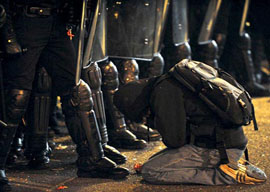
October 31, 2010

The combination created unease at the way things are going, and the unions looked strong enough to stop the latest reform. They miscalculated, because both legislative houses need to balance the country’s budget while continuing to provide services that the French (in fact, most Europeans) regard as essential. Even some of the Socialists voted for the change, knowing that the original lowering of the retirement ages to 60 for partial pension and 65 for full pension that they introduced under François Mitterrand in the 1980s were probably not affordable in the first place.
Something ugly came out of this crisis, and it is part of a trend throughout the Western world to control and bully people who assemble peacefully to demand redress from governments. Radio France International reported on October 28th, “Rhone préfet Jacques Gérault on Wednesday confirmed that police officers, wearing union stickers, attended the November 19 demonstration against the government’s pension reforms and ordered the national police to investigate the matter.” There have been accusations that police officers disguised as demonstrators provoked violence during otherwise calm protests, giving police the pretext to arrest people and break up the assemblies. This has happened in Britain, where police units have infiltrated popular movements, and in the United States, where police have masqueraded as anti-war protestors.
It is not law enforcement’s job to take sides in political disputes or to stop protests. Both the American Constitution and the Universal Declaration of Human Rights place a responsibility on police to protect the citizenry when it calls governments to account. Nothing in either document obliges them to safeguard the interests of politicians, banks or multinational corporations. Yet America, Canada, France, Russia, and Britain let loose the police to subvert popular protests and turn them violent to save the rich and powerful.
The French police played a vicious role during the German occupation, and Lyon was a scene of particularly brutal fighting between the anti-German Resistance and those who had supported the Vichy regime. In Paris, police for four years carried out the instructions of the chief of state, Maréchal Philippe Pétain, and his sometime prime minister, Pierre Laval. This included conducting the notorious roundups of Jews for deportation to death camps. In August 1944, a week before the Allies liberated Paris, the police joined an uprising against the German occupiers. Although more than half of the police were purged and some imprisoned after liberation, many were allowed to return to duty despite their wartime records. Their redemption was so thorough, and the need to give the badly tainted cops credibility was so strong, that Charles de Gaulle awarded the Paris Police Department the Legion of Honor cord worn to this day on their left shoulders. Perhaps they should remember the cord, la fourragère, is for the few days they defended the people rather than for the four years they kept them under surveillance for Vichy and the Germans.